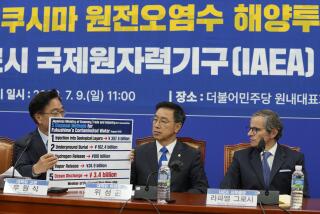S. Korea Asks U.N. Agency for Time to Deal With N. Korea on Its Own
- Share via
SEOUL — SEOUL -- Hoping that its own diplomatic efforts will bear fruit, South Korea has requested that a U.N. nuclear watchdog delay an emergency meeting to deal with the crisis over North Korea’s nuclear ambitions, officials here said today.
The Vienna-based International Atomic Energy Agency has scheduled an emergency session for Feb. 3 to discuss the issue and possibly refer it to the U.N. Security Council, a move that would incense North Korea.
But on Friday, hours after Seoul announced that it would dispatch President Kim Dae Jung’s personal envoy to Pyongyang on Monday, the South Korean government asked the U.N. nuclear regulatory body to put off its meeting. The Foreign Ministry here said it was hopeful that the agency would accede to its request.
Kim is sending special advisor Lim Dong Won, a former minister for unification, to the North for two or three days of talks. Lim is to be accompanied by an envoy of President-elect Roh Moo Hyun, who will take office next month.
Their visit is part of Seoul’s attempt to carve out a role in resolving the crisis over North Korea’s alleged nuclear weapons development program. The regime in Pyongyang insists that the dispute is between it and Washington, not the world at large.
Pyongyang opposes Washington’s attempt to bring the matter before the U.N., which could levy economic sanctions as punishment for North Korea’s pursuit of a uranium-enrichment program, its expulsion of U.N. monitors and its withdrawal from a global accord to halt the spread of atomic weapons. Already famished for food and fuel, Pyongyang has warned that it would regard sanctions as an act of war.
In remarks aimed at calming those fears, U.S. Undersecretary of State John Bolton said Friday that the U.S. would not immediately press for the imposition of sanctions. Washington has said it wants a peaceful solution.
“All of the options are on the table,” Bolton, the top American control official, said in Tokyo, where he wrapped up a trip through Asia. “But the question of sanctions is not something we have any immediate intention of seeking.”
In Washington on Friday, State Department spokesman Richard Boucher supported Seoul’s call for more discussions.
“We think these dialogues serve as important channels to resolve issues of bilateral concern and to call upon North Korea to quickly and visibly respond to the international community’s demands for a denuclearized Korean peninsula,” he said.
Since the row over the Pyongyang regime’s nuclear intentions broke out in October, the U.S. and North Korea have publicly spouted tough rhetoric, accusing each other of chicanery and lies. But in recent days, both sides have also hinted at a willingness to compromise.
For the first time, North Korea suggested Friday that it would look favorably on efforts by a third party to step in as a political broker.
“We can review mediation offers from neighboring countries,” the Chosun Shinbo, a pro-Pyongyang newspaper in Japan, quoted North Korean Foreign Ministry official Oh Sung Chul as saying. “It is a good thing if our neighboring countries look at the nature of this matter and play positive roles.”
China has already offered to be the site of any talks between Washington and Pyongyang.
South Korea has also stepped up its efforts to mediate. The president’s and president-elect’s special envoys to Pyongyang were being sent to “find a peaceful resolution through direct dialogue between the South and the North,” a presidential spokeswoman said.
Pyongyang’s official news agency confirmed the planned visit. Although it appears likely, a meeting between the envoys and North Korean leader Kim Jong Il has not been set.
Kim Dae Jung’s office said Lim would probably carry a letter from the South Korean president to his North Korean counterpart.
But getting Pyongyang’s reclusive Stalinist regime to focus on the nuclear issue could prove hard, as it did in just-concluded ministerial-level talks between the two sides this week.
Early Friday, after hashing things out through the night, the two sides issued a statement that contained only a general commitment by the North to resolving the crisis peacefully, rather than a statement of concrete actions it would take, as the South had wanted.
More to Read
Sign up for Essential California
The most important California stories and recommendations in your inbox every morning.
You may occasionally receive promotional content from the Los Angeles Times.














